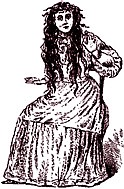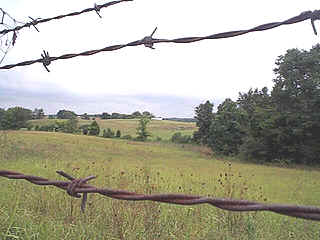The Bell Witch Site
Recommended Books
The Bell Witch SiteOn Social Media The
Bell Witch Site | Copyright © 1995
- 2025 Pat Fitzhugh On Social Media
Pat Fitzhugh's Official Web Site
|
Adams, Tennessee History
"Home of the Bell Witch"
Adams is located about 10 miles northwest of Springfield, Tennessee, and 7 miles south of Guthrie, Kentucky. Nashville is an hour to the southeast.
The town, first called “Red River Station,” was renamed to “Adams Station in honor of Reuben Adams, a local merchant and railroad stockholder. The town's first railroad depot and post office were built in the 1859-1860 timeframe. [1] The Edgefield and Kentucky Railroad connected nearby Guthrie, Kentucky to the Edgefield community on the northern outskirts of present-day Nashville.
The town was first incorporated on November 10, 1869. "Adams Station" was renamed to “Adams” on February 10, 1898. The Charter was repealed in 1899 and the town did not reincorporate until the 1908-1909 period. [a] The town's size was measured as “120 rods in each direction from the center of the depot.” [2] The Edgefield and Kentucky Railroad became a part of the Louisville and Nashville Railroad when the line was extended from Guthrie to Louisville, Kentucky. [3] The mainline now runs to Evansville, Indiana, and the old line leading to Louisville splits off at Guthrie. The trains you constantly see and hear roaring through Adams are traveling between Nashville and Evansville.
Tennessee Historian Albert Virgil Goodpasture describes Adams in its early years:
“The first store-house was built and occupied by Adams & Holloway, who carried on a grocery business. At about the same time, B. O. Crenshaw opened a drygoods store. During the Civil War, nearly all buildings were destroyed. In 1866, only three dwellings remained in the town.
"About 1865 C. M. Brown & Co. established a general merchandise business in the depot. A little later, Capt. Thomas Mallory built a storehouse on the lot now occupied by J. C. Moody's drug store, and a business was conducted there under the firm name of J. E. Ruffin & Co.
"The present business interests of the town are represented by J. E. Gaines, W. S. Miller and Redding & Cobb, drygoods; J. C. Murphey and Winters & Head, groceries; W. H. Howsley, general merchandise; J. S. Moody, drugs; Crouch & Co., and Hallums & Edwards, tobacco dealers; G. A. Farmer, flouring-mill; Alsbrooke & Robinson, Blacksmiths; and J. T. Bell and J. C. Moody, physicians [Author’s Note: J.T. Bell was Dr. Joel Thomas Bell, son of John Bell, Jr.].
"The town has two churches, Methodist and Missionary Baptist. The school under the principalship of S. A. Link is one of the best in the county.” [4]
In the years before air travel took hold, Adams became a bustling town with many businesses and a steady flow of rail and highway traffic. The town's first newspaper, “The Enterprise,” was founded by Charles Willett. Charles later became a professional baseball player, a successful attorney, the Mayor of Adams, and a Tennessee Senator. Mr. Willett passed away in the 1960s and is buried at Bellwood Cemetery. "The Enterprise" was resurrected years later and is currently in limited circulation; copies may be obtained at the Adams Museum and Archives.
The railroad’s discontinuance of passenger service through Adams, along with the construction of Interstates 24 and 65 to take the place of Highway 41, took a heavy toll on Adams. Most businesses were forced to close, and the once-thriving "central business district is now practically a ghost town. Only a few businesses operate in Adams, Tennessee today; everything else is agricultural. Many residents are retired or work in nearby towns.
[1] Albert Virgil Goodpasture, Goodspeed History of Tennessee – Robertson County, 1886, p. 832.
[2] Ralph Winters, Historical Sketches Adams, Robertson County and Port Royal/Montgomery County TN, 1978, p. 47.
[3] Ralph Winters, Historical Sketches Adams, Robertson County and Port Royal/Montgomery County TN, 1978, p. 44.
[4] Albert Virgil Goodpasture, Goodspeed History of Tennessee - Robertson County, 1886, p. 845 [Edited by Pat Fitzhugh for clarity, grammar and spelling].
[a] The town has been incorporated three times since its original incorporation in 1869. The most recent incorporation occurred in 1963, under the name, “The City of Adams.”




